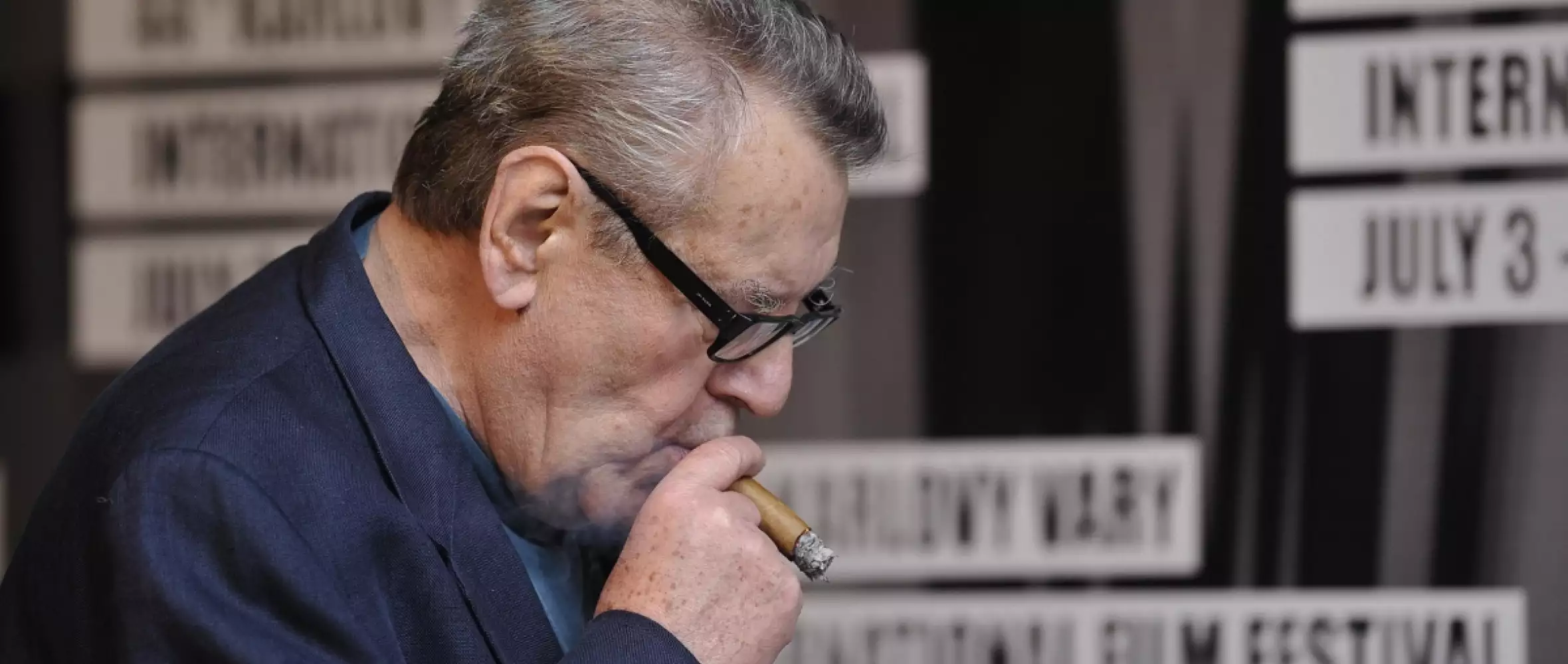
01 May 2018
Miloš Forman 1932 - 2018
Loves of a Great Man
Miloš Forman 1932 - 2018
Loves of a Great Man

This April, a great filmmaker unexpectedly took his leave: Miloš Forman, director of such unforgettable works as Loves of a Blonde and Amadeus, winner of every prestigious film award there is, from the Oscars to the Golden Globes, from Cannes to the Berlinale. He was a brilliant observer of human nature and a storyteller whose films overflowed with his love of people. Maybe that was what made him so loved himself, not only by the Czechs of his native country, but also in America, his adopted second home.
Article by Irena Kovarova from Czech Film Magazine / Summer 2018.
When Miloš Forman was a young boy, he and his parents dressed up in their Sunday best and headed over to the cinema in Čáslav for the future filmmaker’s first moviegoing experience. They took their seats and the opera Bartered Bride began on screen — as a silent film. In Forman’s telling of this story, he would always pause when delivering the paradox of this moment. Then he would continue, revealing that to his great delight, the audience, knowing the opera by heart, began to sing along. From that moment on, cinema was forever fixed in his mind as a communal experience.
Miloš Forman was a remarkable storyteller. For the screen and in person. You’d hear him tell the same stories from his career on many occasions, but you’d never see him bored with his own words. They were perfectly crafted and he was incredibly generous with his audience. He knew the story worked and he was there to bring his listeners joy with his delivery, which in turn warmed his heart.
He was a man larger than life: his baritone voice strong, and his r’s rolled and resounding. One believed when in his presence that his first love was for people, and he made sure that everyone around him could feel it.
Universal Sigh of Sadness
So it was a universal sigh of sadness that reverberated across the globe at the news that Forman had passed away at the age of 86 in the wee hours of April 14. It was a personal loss for many: his wonderful wife and author Martina; his four sons, two sets of identical twins from his second and third marriages; his friends, stars, and every member of the cast and crew of his films; for this writer, who had the privilege of organizing a retrospective tour of his work in North America, which he graciously joined in several cities. It was almost as personal for the filmmakers to whom he was an inspiration, for film writers, and all his fans — and for just about every grownup in the country of his birth, now the Czech Republic, for whom he was the man who achieved it all and of whom they could be proud. Many on both sides of the Atlantic recalled on this occasion what their first Forman film was and where they were when they saw it, making clear how much his films influenced their careers or their understanding of cinema.
“Sadly, we lost one of the greatest directors in the history of film.”
Michael Douglas
And cinema was Forman’s great love. His films were full of life and paradoxes, his guiding lights when writing a film. His grand topic: the pursuit of individual freedom. He learned firsthand, after losing his parents to the Nazis during World War II and living for 20 years under a Communist regime, what it is not to be free. Every film he made touched on this basic human need.
He wasn’t one to sit back and be quiet. His zest for life was clear from early photos of film school in Prague. He towered over his colleagues — not just physically, but also with the sheer power of his ambition and achievement. Never aggressively, but with an air of assurance and humor. When asked, upon receiving his second Oscar for Best Director (on Amadeus; the first was for one Flew over the Cuckoo’s Nest), he said that two is better than one and having one is better than having none. In public he was rarely nostalgic or sentimental.
In Cannes, he joined French filmmakers in their 1968 protest, pulling his film and those of his Czech peers from the competition, despite the fact that with three films the Czechs stood a good chance of winning the Palme d’Or. It wasn’t his last appearance at Cannes, though. He soon returned with other films, most notably Taking Off, which won the Special Jury Award in 1971. He became fast friends with French filmmakers, including Claude Berri, who saved him from sure doom by acquiring The Firemen’s Ball after Carlo Ponti pulled his money out of the production, and Jean-Claude Carrière, with whom he made three films.
Forman’s generosity reached far beyond the cinema screen and his audiences. Possibly inspired by the support he received from filmmakers when setting up shop in America — Mike Nichols helped to turn around the Directors Guild after it attempted to bar Forman from working in the country — he repaid that debt years later to his newly arrived fellow Czech émigré Peter Sís, by hiring him to design the poster for Amadeus, helping to cement the illustrator’s career.
He was a night owl, a consummate reader of the New York Times, a Jon Stewart enthusiast, and a huge sports fan. The Olympic Games would always have him glued to the TV for the duration, his living room in his Connecticut farmhouse, filled with books, films, and light, barely visible through the cigar smoke. His love of sports was a saving grace during the particularly tough period when his American debut, Taking Off, flopped in cinemas, despite praise from Europeans, as he got the chance to contribute the short titled Decathlon to the omnibus feature Visions of Eight (now available thanks to the Olympic collection on the Criterion label). He was a bon vivant who loved good food and lively conversation—often both at the same time, as one can glimpse in Věra Chytilová’s portrait of him for Belgian TV (Chytilová Versus Forman), where their spirited exchanges threaten to derail Forman’s enjoyment of the famous paella at El Quixote in the Chelsea Hotel, his first New York home.
One Lifetime, Two Careers
Forman leaves behind an unparalleled body of work. He would be considered a classic even if he had made only his Czechoslovak films: Audition, Black Peter (which won the main award in Locarno), Loves of a Blonde, and The Firemen’s Ball (the last two both nominated for Oscars). Each of them brings authentic contemporary lives to the screen in a unique way. Yet his American career by far surpassed his early promise. His first take on American society, Taking Off, is a hilarious piece of social comedy that has yet to receive the widespread acclaim that it deserves. Meanwhile, all-around favorites and multiple-oscar-winning masterpieces One Flew Over the Cuckoo’s Nest and Amadeus are now part of the canon. But to this writer, each and every film from his long career is a tour de force, be it the musical Hair, the historical saga Ragtime, or Forman’s adaptation of the 18th-century French novel Les Liaisons Dangereuses, Valmont, far more successful and subtle in relaying the atmosphere and sensuality of the book than Stephen Frears’s better-known attempt. Few others would have dared to put the stories of Hustler publisher Larry Flynt and comedian Andy Kaufman on film the way Forman did in The People vs. Larry Flynt and Man on the Moon. His final film, Goya’s Ghosts, brought paintings to life in an unforgettable manner.
He wore his Czech heritage lightly, yet proudly, but to many Americans he was simply just another countryman. For all that, he will be remembered, and he’ll be with us as long as his films stay on screen, big or small.



